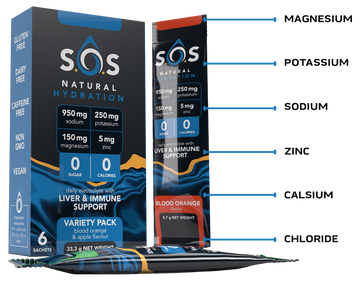
Crafted with Clean ingredients and backed by science for hydration that works as hard as you do
S.O.S was formulated with research-driven electrolyte ratios to support optimal hydration, energy production, muscle recovery, liver and immune support.
It is important to understand that these minerals are not just supplements, but fundamental components of our body's chemistry. They facilitate the proper functioning of our muscles, nerves, and organs, making them indispensable for overall health and well-being.
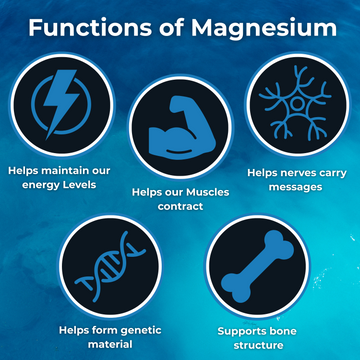
MAGNESIUM
Magnesium is involved in more than 300 metabolic reactions: via activating or producing different enzymes.
One of the key roles of magnesium is to make sure that our cells have enough energy to perform their roles. Magnesium keeps the normal functioning of our cardiovascular and nervous systems by helping nerve cells carry messages (nerve impulses) between the brain and the body, particularly those involved in muscle and heart contraction.
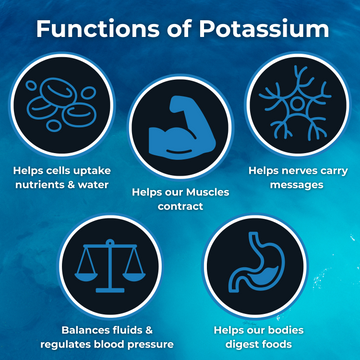
POTASIUM
Potassium is involved in many of our bodily functions. It creates specific channels in the cells which carry out different vital tasks. These tasks include helping our muscles and heart contract, helping our nerve cells communicate, regulating the water balance inside and outside cells, transporting specific substances into our cells, regulating our bodies’ pH, and keeping normal blood pressure.
Potassium also helps in the digestion of foods, by supporting the release of saliva and gastric acids and by helping in the digestion and absorption of proteins and carbohydrates.
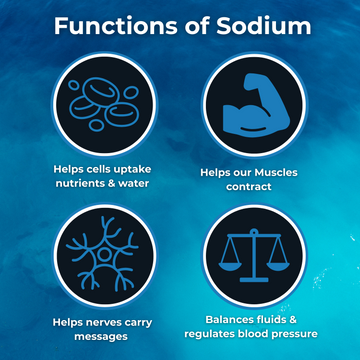
SODIUM
One of sodium’s main functions is to balance the amount and distribution of water in our bodies, playing a key role in the control of our blood pressure.
Sodium channels help to control the amount of water that gets in and out of cells and allow the transport of specific nutrients and compounds (such as amino acids, glucose and vitamins)
Sodium is also important to help our muscles and heart contract and to allow our nerve cells to carry messages between the brain and the body.
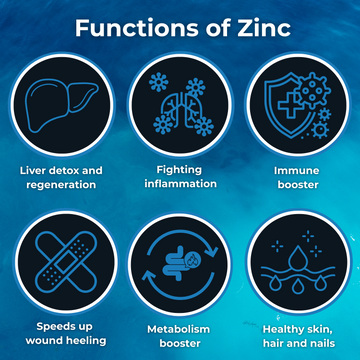
ZINC
Zinc is present in every single cell of our bodies, affecting a wide range of different processes and therefore extremely important. Zinc supports the liver to filter out toxins (alcohol, medications and chemicals) to keep you healthy. It is a powerful anti-inflammatory mineral, which helps reduce inflammation, promotes healing and boosts your immune system.
Zinc helps to create new cells for your hair, nails and skin. It helps to regulate neurotransmitters, which can boost your mood and help you to think clearly.
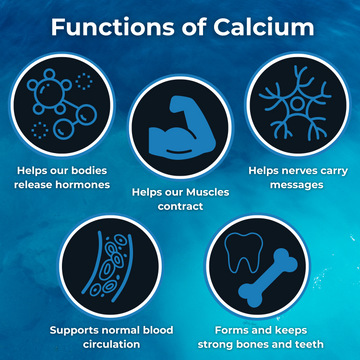
CALSIUM
One of the key roles of calcium is to form and keep our bones and teeth strong. The remaining is used for other vital functions such as to help our blood vessels contract and relax (thus, supporting our normal blood circulation), keeping our hearts beating, moving our muscles and helping our nerve cells carry nerve impulses between the brain and the body.
Calcium is also a key element to activate different enzymes and helps our bodies release hormones.
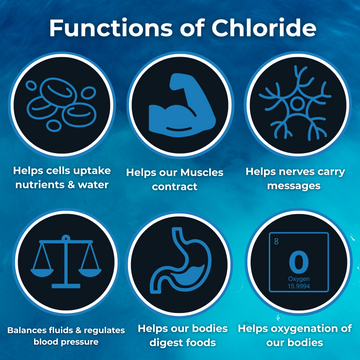
CHLORIDE
Chloride plays an important role in keeping the balance of our
bodies’ fluids (thus, helping to regulate our blood pressure) as well as
the pH.
Chloride is also important to help the muscles and heart contract
and to help our nerve cells carry nerve impulses between the brain and the
body. More so, this mineral is needed to help red blood cells exchange oxygen
and carbon dioxide in both the lungs and other parts of the body.
It also plays a role in the digestion of foods, by supporting
the production and release of hydrochloric acid (HCl) in the
stomach, without which foods could not be properly digested and absorbed.









